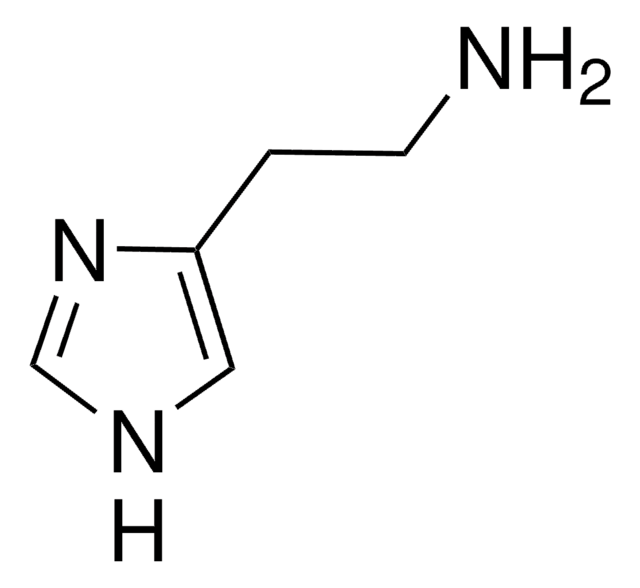49761
Spermidine
analytical standard
Synonyme(s) :
1,8-Diamino-4-azaoctane, N-(3-Aminopropyl)-1,4-diaminobutane
About This Item
Produits recommandés
Qualité
analytical standard
Niveau de qualité
Essai
≥97.5% (NT)
≥99.0% (GC)
Durée de conservation
limited shelf life, expiry date on the label
Technique(s)
HPLC: suitable
gas chromatography (GC): suitable
Indice de réfraction
n20/D 1.479 (lit.)
Densité
0.925 g/mL at 25 °C (lit.)
Application(s)
cleaning products
cosmetics
food and beverages
personal care
Format
neat
Température de stockage
2-8°C
Chaîne SMILES
NCCCCNCCCN
InChI
1S/C7H19N3/c8-4-1-2-6-10-7-3-5-9/h10H,1-9H2
Clé InChI
ATHGHQPFGPMSJY-UHFFFAOYSA-N
Vous recherchez des produits similaires ? Visite Guide de comparaison des produits
Catégories apparentées
Description générale
Application
Actions biochimiques/physiologiques
Conditionnement
Attention
Mention d'avertissement
Danger
Mentions de danger
Classification des risques
Eye Dam. 1 - Skin Corr. 1B
Code de la classe de stockage
8A - Combustible corrosive hazardous materials
Classe de danger pour l'eau (WGK)
WGK 3
Point d'éclair (°F)
233.6 °F - closed cup
Point d'éclair (°C)
112 °C - closed cup
Faites votre choix parmi les versions les plus récentes :
Déjà en possession de ce produit ?
Retrouvez la documentation relative aux produits que vous avez récemment achetés dans la Bibliothèque de documents.
Les clients ont également consulté
Protocoles
HPLC Analysis of Biogenic Amines on Ascentis® RP-Amide
Notre équipe de scientifiques dispose d'une expérience dans tous les secteurs de la recherche, notamment en sciences de la vie, science des matériaux, synthèse chimique, chromatographie, analyse et dans de nombreux autres domaines..
Contacter notre Service technique










